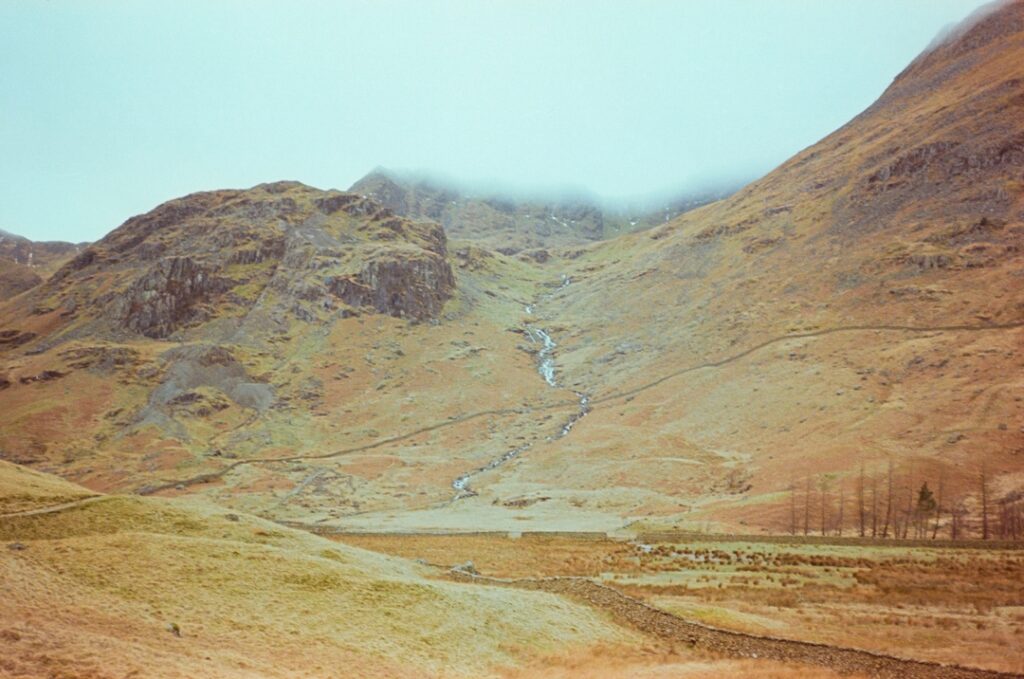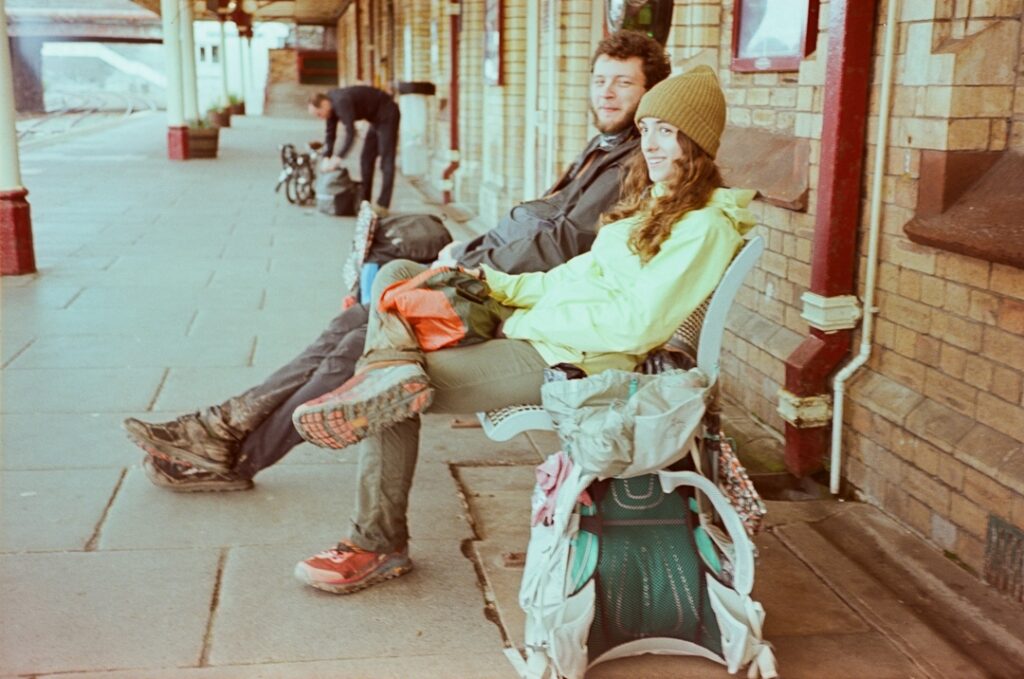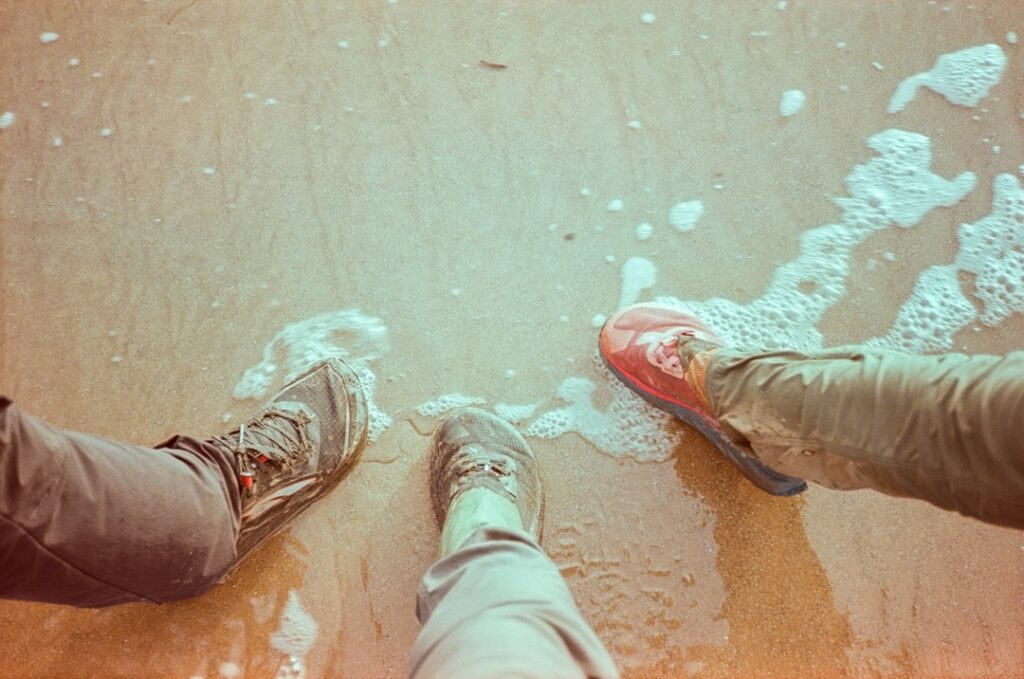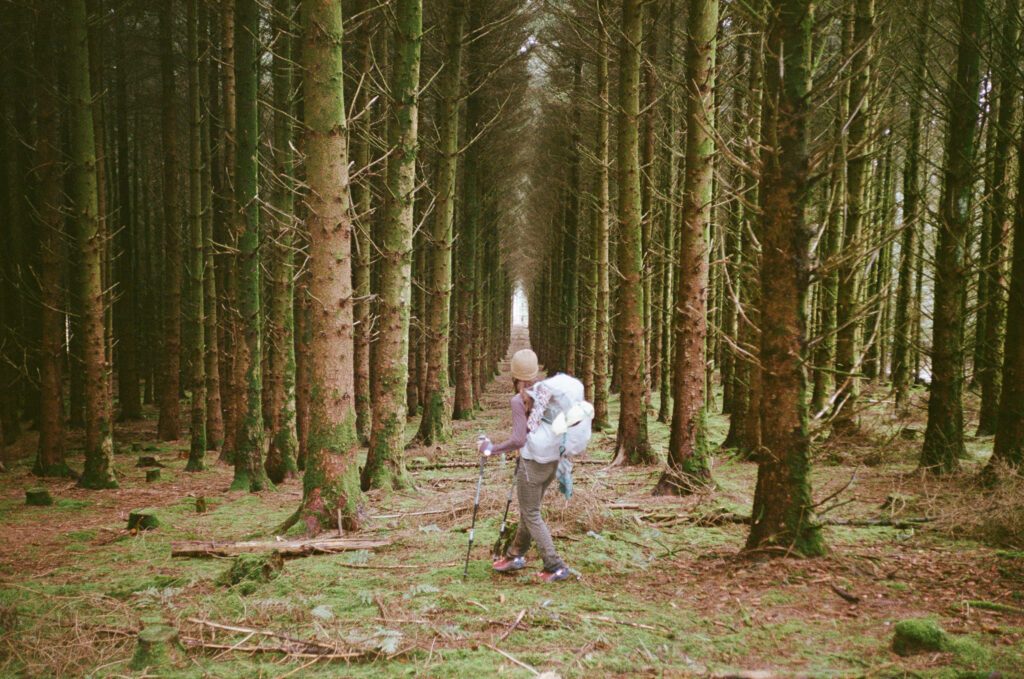Hankering for a long walk, we started exploring our options. Now located in the United Kingdom, we were granted the freedom of roaming paired with the reality that we had to “illegally” wild camp. We accepted the risk, leaving nothing but footprints and taking nothing but photos. Stripped of all else, we’re still dirtbags at heart. These small pockets of wilderness tug at everything in our bones. This specific calling came first from the Lake District but quickly expanded to the renowned Coast to Coast Walk. Caleb and I chose to hike east to west, finishing in (what we imagined to be) the sublime landscapes. Packing up and setting out from Canterbury, our journey couldn’t begin until several hours of train and bus rides were behind us. We arrived in Robin Hood’s Bay by the late afternoon. With limited daylight left, we scurried to the beachside and ceremoniously dipped our shoes into the North Sea. As the sun dipped out of sight, we hiked atop the steep eastern cliffs looking for a suitable and out-of-sight spot to pitch the tent. Our search brought us to a small patch of earth, only feet away from a treacherous drop. Rather desperate at this point, we settled for potential peril with crossed fingers. Throughout the night, the ferocious sound of crashing waves caused dreams of untimely erosion and our own demise. Better death than an angry landlord. Much to our relief, the escarpment held till dawn. Regarding the predicament of being criminal campers, our solution was to await sunset and beat the sunrise. Walking these long days gave us the ability to see our surroundings in many different shades. We hiked into the mighty headwinds that ripped across England, faces chapped but smiling. Our feet sunk into the moist earth, filling our shoes with mud and leaving a dark sediment between our toes. It was late March, meaning the weather was unpredictable and the trail was empty apart from an occasional day hiker. Rain fell each day and the sun made few appearances through the fog. English author Robert MacFarlane admired those infrequent patches of blue, writing of his desire to dive in. After our time in the UK climate, we could cannonball into those pools of color. An invaluable lesson with nature: the weather will persist but your attitude will change. Ironically enough Alfred Wainwright originally wrote, “There’s no such thing as bad weather, only unsuitable clothes” (within his A Coast to Coast Walk book). Acknowledging that truth, especially in the land it was written for, seemed a perfect way to fully immerse.
Caleb and I reveled in the silence of the North York Moors for several days. As we experienced on the last long-distance hike, the hardest battle was finding the right adjustments for our packs. Collar bones bruised and hips some strange type of blistered, we traded the weight from shoulders to waist belts until our bodies adapted. The monotonous terrain faded into a vast openness. Our footpath brought us through fields and across humble plateaus. Herds of sheep dotted the countryside, scampering away at the sound of our hiking sticks. Ancient stone walls crossed as far as we could squint. Once, we slept beside a decaying section. The rocks lay scattered around leaving stairs to the other side. The Moors possessed a quaint beauty that we had come to admire. Epic landscapes are striking no doubt, but it takes thoughtful observation to appreciate the terrains which are quietly holding space. This particular evening was the embodiment of that search. An electric sunset reflected upon the swaying fields, leaving us speechless and awe-inspired. The mellow landscape claimed its beauty. Suddenly so obvious, we were also enlightened with its golden haze.
The rains slowed us down more than anticipated and we found ourselves nearly two days short of where we planned to meet our friend, Tux. We all initially met on the Appalachian Trail and hoped to catch each other on another adventure. Time aligned and he was going to meet us along our Coast to Coast Walk. As we exited the North York Moors National Park, we decided to road walk into a nearby village in hopes that the scheduled bus was indeed stopping. Fortune favored the bold and we spent the following hour completely entertained by a bus load of curious locals. We left our new friends to then board a train, where it became painfully obvious that our wet socks exuded a most horrendous odor. The reconfiguration in our plan skipped some fifty miles of trail and got us closer to the meeting spot for Tux’s arrival. The last leg of our reroute included one final bus ride but it failed to show. Luckily we befriended another stranded traveler and shared the cost of a taxi ride towards the entry of the Lake District. He shared my enthusiasm for Coehlo and the conversation expanded from there. Small memories like these tend to escape our visual documentation but they remain within our hearts as equally moving. We were dropped off at a popular inn, the trail snaking just around its property led us into our first unspoiled views of the Lake District’s mountains. That night we pitched our tent near nature’s best white noise: a swift, rocky stream. Again setting out at dawn, the world around us slowly faded into day. Overjoyed to be in the mountains again, we pushed hard through the rugged inclines. Our trail legs sometimes kicking into overdrive. Throughout that day we summited multiple peaks and followed a gorgeous ridgeline with the graciousness of a sunny sky. Settling into a gap for our late lunch, a man passed by asking how many miles to Grasmere. In my geographical ignorance I had believed us to be trekking towards the town, as we were to meet Tux there the following day. Fortunately for us he was far more aware, pointing back the opposite direction. After assessing the maps, we made the defeated decision to trek back some and find an inn for the night. This area of trail was highly trafficked and didn’t offer viable stealth spots. After exiting the ghyll, we road-walked through the town stopping at a couple different inns. Most were seemingly closed for the evening, but we caught a man leaving one and he directed us to a tucked away lobby. We made the room a DIY laundromat, the shower for a washing machine and an open window seal for a dryer. After a hearty English breakfast the next morning, we walked into town and awaited our friend’s arrival. Right as planned he stepped off the bus and the adventure proceeded. Since we had already hiked the previously planned section, we chose an alternative route out of Grasmere. We planned to bag Scafell Pike for the sake of it being England’s tallest mountain. With a late afternoon start, our only goal for that day was to get closer to the mountain. We stopped in an old rock quarry, exploring the impressive man-made tunnels and caves. At the end of the longest tunnel, we found an eerie chamber. Here, Caleb found a wooden box laying open. Being far too curious, we all peeked under the wax-covered lid; seeing the contents within sent our mind into a swirl. A lock of hair, a feather, a human tooth, a 19th century family portrait, a heart shaped golden locket, a mirror, and a note written in an unfamiliar script. The sheer possibilities of its purpose were enough to make us shiver. We left the box exactly as we found it and exited the tunnel. A short climb beyond revealed a separate area of the cave. Rocky benches sat in the center of perfectly flat floor space. Our swooshing echoes, of mattress pads blown up and sleeping bags fluffed, harmonized with chirping bugs and lonely cooing birds. Since we already lived a scary encounter, spooky stories were rescheduled. Gathering around the camp stoves, we finally caught up on life since the Appalachian Trail. After living with people in such a wildly communal way, a gritty connection forms. Tux shared his post-summit days, hitchhiking to the biggest cities in the east. We laughed together and celebrated the kindness of strangers. I started to believe that kind of goodwill only existed on trail. As we talked further, I recognized my error. Had we not been humble and open-minded, so many experiences would’ve been too embarrassing or scary. Lowering that guard made room for an intimate and personal form of socialization. After our red torches clicked off, the peaceful drizzle beyond the cave mouth lulled us to sleep.
True to our sunrise schedule, we began an early approach towards Scafell. The miles passed unnoticed as we all enjoyed the mystical surroundings. England didn’t have the elevation we’d experienced in America, leading to lighthearted jokes about an easy summit. After the White Mountains of New Hampshire, surely we could conquer these. As we gained elevation, that belief came into speculation. Fierce bursts of wind and fog fought against our balance. The pelting rain created countless stream crossings for us to stomp through. We furthered the humor and all yelled towards the sky, “More!” That was exactly what we were granted. Just over an hour from our proposed summit time, the chill finally set into our bones. We’d span out and then recollect to check in. Unanimously, we ventured further over false summits. Right as we began to doubt, the monument atop Scafell revealed itself through the clouds. Our celebratory howls were insulated by the grey layer around us. Were it not for that monument, the peak would’ve been unrecognizable. With only about ten feet visibility, one rocky outcrop seemed no different than the next. We had achieved the intended goal but we were now far more interested in finding a descent. I carried the daunting task of navigation, every few moments anxiously checking my phone. Being on so many adventures with others, I’ve gained a sense of people. Particularly, how the elements wear on them. Tux was being an absolute trooper, but I could tell he was reaching wit’s end. Caleb and I weren’t far from it either. The bothy I aimed to hike to would offer much needed shelter. Despite being four hours away, I knew it to be our most viable option. When there weren’t 40 mph gusts blowing us over, it was flooded marshland soaking our ankles. Tenting, at this point, was out of the question. Our drenched trio needed to get somewhere dry, as fast as possible. The torrential downpour eliminated our chance for conversations, but I would frequently glance back to check on the guys. Caleb walked several paces behind me and Tux held up the tail end. The responsibility of getting us to safety weighed heavily. Intrusive thoughts of death flickered, as they sometimes do in times of sketchy adventure. As the weather picked up intensity, I started praying aloud for us to arrive sooner than later. Just as my hope started to waver, we descended below the clouds and into a small valley. Across the expansive field, I caught a glimpse of a stone structure. My maps pointed me another direction, but I made the decision to test our luck. I waited for Caleb to catch up and informed him of my plan to push ahead and scope out the unknown building. Making a beeline for the shelter, I encountered one final stream crossing. At this point I was soaked to the bone and another splash didn’t intimidate me too much. The fast paced flow disguised how deep it was and I sunk down to my knees. Stomping up the final incline, I nearly shouted from my relief that it was indeed another bothy and much bigger than our intended one. I struggled with the old door and burst in. After nearly nine hours of howling winds deafening me, the stone bothy held an unexpected quietness. As surprised as I was to see them, a group of guys looked bewildered at my tiny frame and ridiculous smile. They knew the outrageous conditions persisting outside and I could tell they were curious about where I had traveled from. I stripped my now useless rain layer off and answered their questions about my route. With them was an experienced guide, he knew the area and seemed astonished that I had bagged Scafell Pike that very day. I too felt a slight disbelief, firstly for underestimating the mountain and secondly that I had finally made it to shelter. Shortly after, Caleb and Tux made it inside. The guys were so kind in making room and getting us settled in. They even made Tux some tea to help him warm up. I didn’t want to acknowledge it in the field, but we were worried he may become hypothermic. That fear kept me moving and motivating them to push onward. Now that we were in the comfort of the bothy, sighs of relief vacated my chest. Long after we settled in and ate dinner, a couple literally rolled into the scene. As proud as I felt to have survived our hike, I was impressed that they had just arrived on bike. Needless to say, we were super interested in them and their cycling. It was easy to imagine that we’d meet again, on another adventure someday. We chatted Josh and Sarah up as long as we could before slowly sinking into our sleeping bags. Rest that night was dutifully earned and graciously accepted. The faint flicker of a candlestick flame bathed the bothy in an ethereal glow. Outside, fierce winds pounded against the slate wall and threatened the old window panes. As I laid on the plywood platform, I began to lose sense of the ferocious storm. Closing my eyes, I felt our stone hut soar through deep space and land within my dreams.
The morning arrived quickly, never letting up on the biting chill. We took our time packing and eating breakfast. After so many days of dawn beginnings, it was relaxing to slow it down and enjoy the process. We parted ways with our group of fellow punishment gluttons and began the trek to our original intended bothy. We planned to exit the mountains that day but not before we got a glimpse of the five star views this particular hut boasted. A mostly clear view expanded through the tiny window; a valley outstretched below with cascading mountains framing it. Nearby, we admired the resting place of Wainwright’s ashes. With the clouds temporarily lifted, the landscape around us felt so detailed and exciting. Shrouded views from the previous day now opened up to the most incredible sights. As we made our way towards the original trail, we lost count of the gushing falls snaking down the mountainsides.

Despite the epic scenery, the realization that we had brushed death (or at least a case of hypothermia) loomed just behind us. Wainwright wrote, “The fleeting hour of life of those who love the hills is quickly spent, but the hills are eternal. Always there will be the lonely ridge, the dancing beck, the silent forest; always there will be the exhilaration of the summits.” During our descent, I noticed a freshly withered sheep carcass splayed on the trailside. As endearing as they are alive, it’s equally saddening to see them lifeless. Shortly after, I spotted a second and then third dead sheep. I couldn’t shake the oddity. Three fragile humans exited the mountains unscathed, while three robust sheep perished. Eventually it would be our fate too, but not this time.
Once we reached the well-kept gravel section, day hikers with squeaky clean gear began to pass us heading in the opposite direction. Suddenly, the experiences of our last couple days felt so wild and remote; like some unfathomable, exaggerated tale that only a fishing partner could attest to. If nothing else, the three of us will always know exactly what it took to complete our traverse across Scafell. With that exhilaration behind us, we crashed a local Inn for some sustenance and a real bed. We were the only ones there for the night and got a full English breakfast all to ourselves the following morning. From there, it was mellow footpaths to reach our end goal of St. Bees. Towards the end of the day, we’d tired of the run-down buildings and neighborhoods. We reached a road crossing and could see the ocean just a couple miles ahead. After scoping out the trail, we decided against the muddy field trek and caught a bus instead. From our location, no buses went into St. Bees so we rode first into Whitehaven. We stepped off and immediately began a search for food. Only a few moments passed before Tux realized he had dropped his passport on the bus. Despite the chaos, he handled the stress extremely well and made all the necessary calls to inform the driver. In an effort to help, I downloaded an app that let me track buses on the local routes. Pinpointing our exact bus, I found a station where we could potentially reconnect. We were all a little nervous about the entire matter, but we sat on a bench in full faith. Tux made a sly joke about the disdain British transportation workers would feel when they saw his German passport. We hadn’t discussed the topic for obvious reasons, but it didn’t stop us from laughing. I responded that it was better him than us, since the British beef with Americans was so multi-dimensional. To which he quipped, “True, they’re probably still made about that little tea party.” Humor, in the face of unknown outcomes, is the best boost for morale. Right on time, our pesky bus arrived at the station and Tux was miraculously reunited with his passport. We then walked to another station, having just enough time to catch sunset over the Irish Sea.

On the mostly empty platform, we awaited our train. A man overheard me talking and exclaimed that an American in Workington was the equivalent of him showing up in Boise, Idaho; oddly specific and surprisingly accurate. I do love my homeland, but being an American abroad sometimes feels so cringe. It’s like being typecast for a role that you didn’t know you were auditioning for. That was one enlightening topic that we discussed with Tux. He shared his experiences of being an international on the AT, agreeing that it’s hard to break the barrier of country based stereotypes. I guess that is something all travelers will experience. Regardless, it’s inspired me to look further than where someone is from and acknowledge them as a unique individual first.

We finally arrived in St. Bees and finished the last piece of our Coast to Coast Walk. In rhythm with the incoming tide, my heart swelled at the sight of that long stretch of sand. As we did in the North Sea, we now dipped our shoes into the Irish Sea. Under the sunny open sky, our trio celebrated a mission accomplished.

We hiked back into town for more food and another Inn stay. The following day predicted storms so instead of hiking we thought to enjoy the ease of a city. In our delusional, calorie deficient minds, we expected a more relaxing experience could be had within the convenience of civilization. Tux was flying out of Manchester in a couple more days and, coincidentally, it was the only place in all of England that had a clear sky forecast. On our train ride, I saw a woman reading a Richard Powers book. Just before our stop, I told her of my admiration for his work and we exchanged sentiments about his enthralling storytelling. We stood to leave and she told us, “You’re lucky to come when you did, there’s actually going to be sunshine in Manchester!” Apparently sunny days were few and far between, making us feel validated in our choice. It didn’t take long for that to wither into sheer doubt. We walked a few blocks from the station and were immediately overwhelmed by the bustle of city life. Everyone around us furiously pushed suitcases and headed for whatever itineraries they’d carefully crafted. It felt like no locals existed in that slice of the world, a saddening thought that made it feel less charming and more scammy. Collectively we made the decision to take a bus away from the city center, in hopes of finding better vibes. To our relief, we discovered the gem that is Didsbury. It was still a stark contrast to our lazy village experiences, but it excused the ridiculousness within downtown Manchester. I’ve found that people often over-romanticize travel, myself included. Despite our many adventures, Caleb and I still sometimes underestimate the stress and difficulties that arise in the most unexpected parts of a trip. After the intense chaos of our Scafell summit, we thought getting back to the city would be a refreshing trade. It proved to be exponentially more taxing, despite the perfect weather. Repeatedly we’ve been shown that, along great endeavors, life unfolds exactly like it wants as opposed to how you hope and plan. Especially when we’re on foot, we take each day as it comes and give thanks to whatever was presented. Truly, it never mattered if it was raining in the Lakes or if there was sunshine in Manchester.
